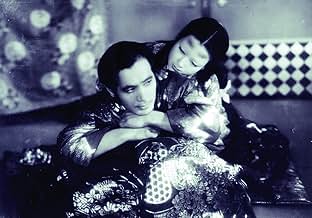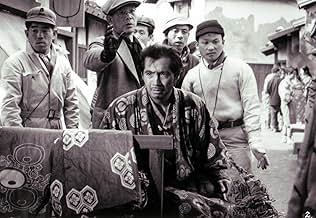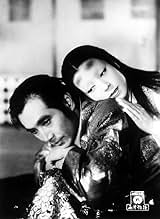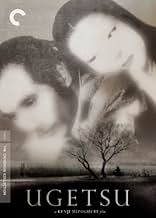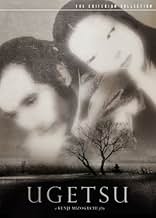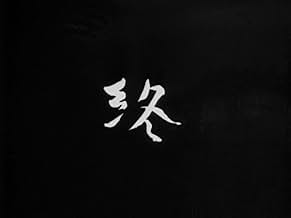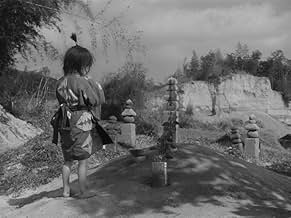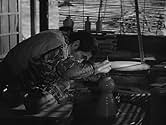VALUTAZIONE IMDb
8,1/10
27.490
LA TUA VALUTAZIONE
Una storia di ambizione, famiglia, amore e guerra ambientata nel bel mezzo delle guerre civili giapponesi del sedicesimo secolo.Una storia di ambizione, famiglia, amore e guerra ambientata nel bel mezzo delle guerre civili giapponesi del sedicesimo secolo.Una storia di ambizione, famiglia, amore e guerra ambientata nel bel mezzo delle guerre civili giapponesi del sedicesimo secolo.
- Regia
- Sceneggiatura
- Star
- Candidato a 1 Oscar
- 6 vittorie e 2 candidature totali
Eitarô Ozawa
- Tôbei
- (as Sakae Ozawa)
Recensioni in evidenza
'Ugetsu' is a Japanese film directed by Kenji Mizoguchi based on stories in Ueda Akinari's book titled Ugetsu Monogatari. At the basic level, this is a story about survival during the Japanese Civil Wars in the late 16th century. The film follows two married couples namely Genjurō and Miyagi, Tōbei and Ohama of the Ōmi Province. They get uprooted along with a lot of other families when their village gets attacked by Shibata Katsuie's army. Genjurō being a potter decides to go to Ōmizo to sell his wares to earn money. He goes to Ōmizo with Tōbei and Ohama while Miyagi decides to stay back and take care of Genichi(Miyagi and Genjurō's son). While in Ōmizo, Genjurō gets attracted to the mysterious and enigmatic Lady Wakasa and becomes overwhelmed by his interest in her, and Tōbei, who was always a bit of a delusional dimwit, gets more and more inclined towards living the life of a samurai and show-off his bravery and strength. Tōbei ends up seeking out Samurai soldiers leaving his wife Ohama alone and helpless during chaotic wartime.
Along with 'Rashomon', 'Ugetsu' is considered by many critics to be the film that opened doors for Japanese cinema in the western world and gave the cinema in Japan a global exposure. Like 'Rashomon', this film was also based on Japanese folk tales, but Mizoguchi's humanist filmmaking made it relevant for the 1950s and its relevance hasn't waned at all in the last 50 years. 'Ugetsu' belonged to a whole line of films that got released after WWII along with 'Rashomon', 'The Bicycle Thief', 'The Planes are Flying', 'Ivan's Childhood', etc. which looked at war in a critical way instead of glorifying. They critiqued the very purpose of war by brutally depicting its devastating consequences. Although 'Ugetsu' is set in 16th century Japan during the Japanese Civil War, for me it clearly is an allegory for Japanese society during WWII and the allegory here is a lit bit more overt and obvious than the same in 'Rashomon'.
This can surely be seen as a feminist film. We see the men fall prey to puerile ambitions and greed, while the women are left helpless and asked to fend for themselves during a time of war when they are more prone to danger and harm with ravenous and wild warriors running around everywhere. But the women in the film do what they have to do without showing any fear and without accepting defeat. After watching this film, I don't think it is possible for anyone to not fall completely in love with the character of Miyagi. She has unconditional love for her husband Genjurō and their son Genichi. She does whatever she has to, to make sure her son survives under difficult, harsh conditions, when Genjurō was spending time with Lady Wasaka. This film shows the hopeless nature of gender inequality that existed in medieval Japan and how women were extremely vulnerable.
The film as I mentioned before is an allegory for the Japanese society and the Japanese political system in the WWII era. Like Tōbei, some men are too drawn to the idea of power and will go to any lengths to prove to others that they are powerful by engaging in pointless fights. Genjurō represents those people who being led by unrestricted greed want to utilise war in their own way by making use of people's troubles to fill up their pockets. Lady Wasaka is very mysterious and interesting character. She is a very Mephistopheles- like character who lures Genjurō into her world by promising him eternal happiness, wealth and love. The Faust-esque Genjurō falls for her and abandons his own family. If the people sitting on thrones are led by the greed for power and the greed for lust and wealth, it can sometimes lead to irreparable damage to their country and its people. This might sound preachy, but the film presents this through the screenplay instead of blatant sermons. The film is also a commentary on the disappearance of Buddhist ideals and principals in modern Japanese society.
Along with Mizoguchi's style of storytelling, one can't help but admire the skill of his camera work. The film has many beautiful wide shots which serve both purposes - beauty as well as thematic relevance. There are some seamless transitions from one scene to another. Mizoguchi also beautifully builds tension and sets a Gothic creepy atmosphere in certain scenes which lends the film a genuine horror element. However, 'Ugetsu' like 'Rashomon' ends in a very optimistic and emotional note.
'Ugetsu' is a film whose importance and significance in film history can never be questioned. It is an artistic allegory of life during wartime. As long as the concept of war exists in human society, this film will continue to have significant relevance.
Along with 'Rashomon', 'Ugetsu' is considered by many critics to be the film that opened doors for Japanese cinema in the western world and gave the cinema in Japan a global exposure. Like 'Rashomon', this film was also based on Japanese folk tales, but Mizoguchi's humanist filmmaking made it relevant for the 1950s and its relevance hasn't waned at all in the last 50 years. 'Ugetsu' belonged to a whole line of films that got released after WWII along with 'Rashomon', 'The Bicycle Thief', 'The Planes are Flying', 'Ivan's Childhood', etc. which looked at war in a critical way instead of glorifying. They critiqued the very purpose of war by brutally depicting its devastating consequences. Although 'Ugetsu' is set in 16th century Japan during the Japanese Civil War, for me it clearly is an allegory for Japanese society during WWII and the allegory here is a lit bit more overt and obvious than the same in 'Rashomon'.
This can surely be seen as a feminist film. We see the men fall prey to puerile ambitions and greed, while the women are left helpless and asked to fend for themselves during a time of war when they are more prone to danger and harm with ravenous and wild warriors running around everywhere. But the women in the film do what they have to do without showing any fear and without accepting defeat. After watching this film, I don't think it is possible for anyone to not fall completely in love with the character of Miyagi. She has unconditional love for her husband Genjurō and their son Genichi. She does whatever she has to, to make sure her son survives under difficult, harsh conditions, when Genjurō was spending time with Lady Wasaka. This film shows the hopeless nature of gender inequality that existed in medieval Japan and how women were extremely vulnerable.
The film as I mentioned before is an allegory for the Japanese society and the Japanese political system in the WWII era. Like Tōbei, some men are too drawn to the idea of power and will go to any lengths to prove to others that they are powerful by engaging in pointless fights. Genjurō represents those people who being led by unrestricted greed want to utilise war in their own way by making use of people's troubles to fill up their pockets. Lady Wasaka is very mysterious and interesting character. She is a very Mephistopheles- like character who lures Genjurō into her world by promising him eternal happiness, wealth and love. The Faust-esque Genjurō falls for her and abandons his own family. If the people sitting on thrones are led by the greed for power and the greed for lust and wealth, it can sometimes lead to irreparable damage to their country and its people. This might sound preachy, but the film presents this through the screenplay instead of blatant sermons. The film is also a commentary on the disappearance of Buddhist ideals and principals in modern Japanese society.
Along with Mizoguchi's style of storytelling, one can't help but admire the skill of his camera work. The film has many beautiful wide shots which serve both purposes - beauty as well as thematic relevance. There are some seamless transitions from one scene to another. Mizoguchi also beautifully builds tension and sets a Gothic creepy atmosphere in certain scenes which lends the film a genuine horror element. However, 'Ugetsu' like 'Rashomon' ends in a very optimistic and emotional note.
'Ugetsu' is a film whose importance and significance in film history can never be questioned. It is an artistic allegory of life during wartime. As long as the concept of war exists in human society, this film will continue to have significant relevance.
In the beginning of the springtime in the period of the Japanese Civil Wars of the Sixteenth Century in Lake Biwa in the Province of Omi, the family man farmer and craftsman Genjurô (Masayuki Mori) travels to Nagahama to sell his wares and makes a small fortune. His neighbor Tobei (Sakae Ozawa) that is a fool man dreams on becoming a samurai, but he can not afford to buy the necessary outfit. The greedy Genjurô and Tobei work together manufacturing clay potteries, expecting to sell the pieces and enrich; however, their wives Miyage (Kinuyo Tanaka) and Ohama (Mitsuko Mito) are worried about the army of the cruel Shibata that is coming to their village and they warn their ambitious husbands. Their village is looted but the families flee and survive; Genjurô and Tobei decide to travel by boat with their wives and baby to sell the wares in a bigger town. When they meet another boat that was attacked by pirates, Genjurô decides to leave his wife and son on the bank of the river, promising to return in ten days. Genjurô, Tobei and Ohama raise a large amount but Tobei leaves his wife to buy the samurai outfit and seek fame and fortune. Meanwhile the female aristocratic Lady Wakasa (Machiko Kyô) and her servant ask Genjurô to bring her shopping to her fancy Kutsuki House. Sooner Genjurô and Tobei discover the price they have to pay for their ambition.
"Ugetsu Monogatari" is the first movie that I have watched of Kenji Mizoguchi and I am impressed with this masterpiece. This supernatural story is very well constructed in a historic context of the Japanese Civil Wars of the Sengoku period, with two family dramas caused by the blindness of greed. This feature is supported by a magnificent cinematography in black and white, and the scene in the foggy lake is a piece of art. The performances are awesome, and the cast really seems to be living in the Sixteenth Century in Japan. My vote is nine.
Title (Brazil): "Contos da Lua Vaga" ("Tales of the Vague Moon")
"Ugetsu Monogatari" is the first movie that I have watched of Kenji Mizoguchi and I am impressed with this masterpiece. This supernatural story is very well constructed in a historic context of the Japanese Civil Wars of the Sengoku period, with two family dramas caused by the blindness of greed. This feature is supported by a magnificent cinematography in black and white, and the scene in the foggy lake is a piece of art. The performances are awesome, and the cast really seems to be living in the Sixteenth Century in Japan. My vote is nine.
Title (Brazil): "Contos da Lua Vaga" ("Tales of the Vague Moon")
Ugetsu is a film that separates itself from both period pieces of its time and from Japanese film of any era. It neither has the ferocious, exiting energy that Kurosawa successfully utilized, nor the slow mundane nature that Ozu became known for. Rather it attempts (successfully) to give a drawn out, slightly surrealistic atmosphere that exhibits images of lingering beauty throughout its short length. What drew me into the film deepest was the usage of not style or substance (if that makes sense), but rather these images that remained on your mind long after the film was finished. A sabotaged boat drifting away in the fog with nothing but a dead man aboard, an enchantress' seduction of a naive peasant and a landscape dotted with danger and war, all make up some of the most beautiful images, that would not be out of place in a painting. They alone say more then most films do in their entire message.
The film nonetheless has some very impressive subject matter to its credit, dealing with war, greed and the line between reality and the spiritual world. Throughout the film we see two peasants progressively grow to lust for the riches of the world, Genjurô desires to sell his wares and become wealthy, while Tobei desires to be a samurai and have power. In time they both get to a point where this is a reality, where one of them fulfills what he desires, the other is led into a surrealistic haze by a demonic seductress. In the end the loss of what was important all along becomes apparent, and a message of humility becomes the films point.
Though it is not nearly as accessible a film as Kurosawa's period pieces of the same time, Ugetsu succeeds on a level that they do not. It brings an element of sheer beauty I have not been acquainted with by any Japanese director. The camera moves much slower as to give you a sense of your surroundings, to allow the film to become part of you. In doing this Mizoguchi distances some viewers, while at the same time bringing many to a level impossible with any other director (Eastern or Western). He successfully does what all great artists do, he makes his art truly great and therefore truly subjective.
There is not a lot I can further say about this beautiful film except that it is best taken on an image by image base with the real plot as a second consideration. When one has experienced the images the plot becomes more meaningful, and the result is one of the most beautiful films one will ever witness. I gave Kenji Mizoguchi's crowning achievement a deserving 9/10. Ugetsu is a beautiful flawless example of the cinema that I sincerely recommend.
The film nonetheless has some very impressive subject matter to its credit, dealing with war, greed and the line between reality and the spiritual world. Throughout the film we see two peasants progressively grow to lust for the riches of the world, Genjurô desires to sell his wares and become wealthy, while Tobei desires to be a samurai and have power. In time they both get to a point where this is a reality, where one of them fulfills what he desires, the other is led into a surrealistic haze by a demonic seductress. In the end the loss of what was important all along becomes apparent, and a message of humility becomes the films point.
Though it is not nearly as accessible a film as Kurosawa's period pieces of the same time, Ugetsu succeeds on a level that they do not. It brings an element of sheer beauty I have not been acquainted with by any Japanese director. The camera moves much slower as to give you a sense of your surroundings, to allow the film to become part of you. In doing this Mizoguchi distances some viewers, while at the same time bringing many to a level impossible with any other director (Eastern or Western). He successfully does what all great artists do, he makes his art truly great and therefore truly subjective.
There is not a lot I can further say about this beautiful film except that it is best taken on an image by image base with the real plot as a second consideration. When one has experienced the images the plot becomes more meaningful, and the result is one of the most beautiful films one will ever witness. I gave Kenji Mizoguchi's crowning achievement a deserving 9/10. Ugetsu is a beautiful flawless example of the cinema that I sincerely recommend.
One of the greatest of all Japanese films, this makes many Top 10 lists of the greatest films of all time.
Genjuro (Masayuki Mori), a potter, and his brother Tobei (Eitaro Ozawa), a farmer, are seeking fame and fortune, or fortune and fame as the names are listed.
The lake scene is not to be missed. It is beautiful and creepy. After being warned about pirates, the two me head off alone and meet Machiko Kyo, who was also the woman in Rashomon.
There is a beauty in this film that can't be described adequately. The camera paints a picture that is enchanting and melodic.
Kenji Mizoguchi, who went on to do the magnificent Sansho the Bailiff, has given us a pleasure that will be enjoyed again and again.
Bruce Bennett at the New York Sun said it best, "When the name Kenji Mizoguchi is intoned, every piece of camera equipment on earth should execute a deep bow."
Genjuro (Masayuki Mori), a potter, and his brother Tobei (Eitaro Ozawa), a farmer, are seeking fame and fortune, or fortune and fame as the names are listed.
The lake scene is not to be missed. It is beautiful and creepy. After being warned about pirates, the two me head off alone and meet Machiko Kyo, who was also the woman in Rashomon.
There is a beauty in this film that can't be described adequately. The camera paints a picture that is enchanting and melodic.
Kenji Mizoguchi, who went on to do the magnificent Sansho the Bailiff, has given us a pleasure that will be enjoyed again and again.
Bruce Bennett at the New York Sun said it best, "When the name Kenji Mizoguchi is intoned, every piece of camera equipment on earth should execute a deep bow."
The movie starts out pretty uncomfortably, two peasants in 16th century Japan who dream of richness and glory so blindly, they can't even hear the pretty straight-forward protests of their loving wives who try to convince them that their happiness is fine at home. When one, a pottery smith, makes a small bundle selling his wares, they decide to make a much larger batch together and become rich.
Forced out of their homes by an approaching war and uncertain where to go, they take their wares to a thriving market place, where the second peasant's ambition to be a samurai divides them and causes all four characters, the two peasants and their wives, to be separated, all fending for themselves amongst the war and various classes differently.
At this point the film reverses itself and instead of being a pretty skin-deep, tragic bud of greed, it blooms into a beautiful and haunting tale of obsession and illusion. The two main stories of the peasants and their wives are opposite only in their imaged realism, where one peasant falls completely under the curse of an enchanting ghost and the other lies and steals his way to fame, only both of them are eventually knocked down from their own hubris and forced to finally awaken to what their wives have said all along.
It's quite exquisite, this movie, with its long takes and its lack of the usual constructs that make up messages of obsession and greed. Once it gets beyond the small, uncomfortable, claustrophobic world of the peasant's home, it becomes audaciously challenging and mysterious, so that the same small home becomes amazingly wonderful and comforting. The very essence of the movie is breathed into the emotions of the audience in very subtle ways, making a very unforgettable cinematic experience.
--PolarisDiB
Forced out of their homes by an approaching war and uncertain where to go, they take their wares to a thriving market place, where the second peasant's ambition to be a samurai divides them and causes all four characters, the two peasants and their wives, to be separated, all fending for themselves amongst the war and various classes differently.
At this point the film reverses itself and instead of being a pretty skin-deep, tragic bud of greed, it blooms into a beautiful and haunting tale of obsession and illusion. The two main stories of the peasants and their wives are opposite only in their imaged realism, where one peasant falls completely under the curse of an enchanting ghost and the other lies and steals his way to fame, only both of them are eventually knocked down from their own hubris and forced to finally awaken to what their wives have said all along.
It's quite exquisite, this movie, with its long takes and its lack of the usual constructs that make up messages of obsession and greed. Once it gets beyond the small, uncomfortable, claustrophobic world of the peasant's home, it becomes audaciously challenging and mysterious, so that the same small home becomes amazingly wonderful and comforting. The very essence of the movie is breathed into the emotions of the audience in very subtle ways, making a very unforgettable cinematic experience.
--PolarisDiB
Lo sapevi?
- QuizThe plot is a combination of two tales from the work of Ueda Akinari called "Tales of moon and rain".
- BlooperAfter the soldier cuts off the general's head there's no blood on his sword.
- ConnessioniFeatured in De l'origine du XXIe siècle (2000)
I più visti
Accedi per valutare e creare un elenco di titoli salvati per ottenere consigli personalizzati
- How long is Ugetsu?Powered by Alexa
Dettagli
Botteghino
- Lordo Stati Uniti e Canada
- 11.197 USD
- Fine settimana di apertura Stati Uniti e Canada
- 6154 USD
- 5 mar 2017
- Lordo in tutto il mondo
- 24.959 USD
- Tempo di esecuzione
- 1h 36min(96 min)
- Colore
- Proporzioni
- 1.37 : 1
Contribuisci a questa pagina
Suggerisci una modifica o aggiungi i contenuti mancanti


